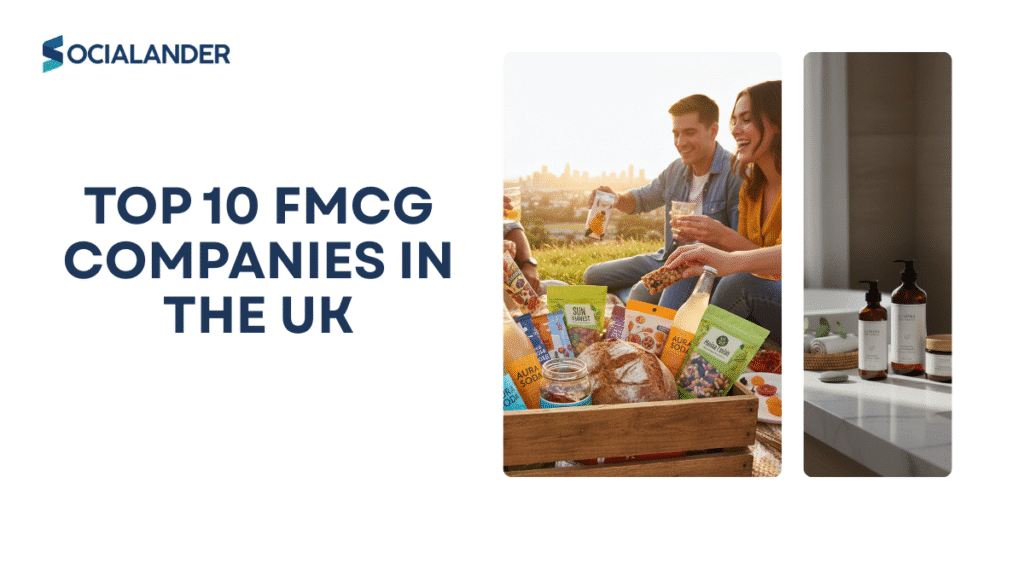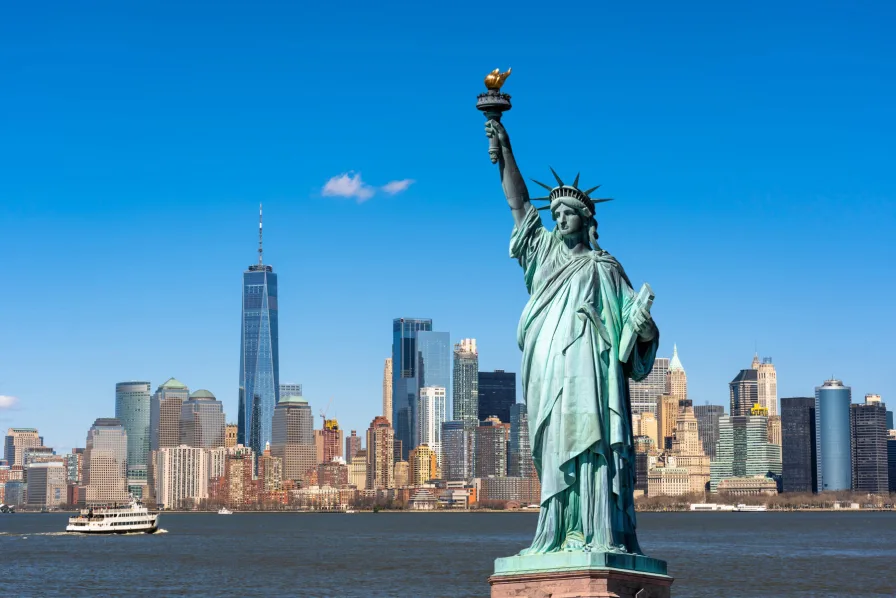
The UK Fast-Moving Consumer Goods (FMCG) industry is one of the most dynamic sectors of the economy. With billions in annual revenue, it covers food, beverages, personal care, household products, and tobacco. These companies collectively generate billions in revenue and employ hundreds of thousands across the nation.
The global FMCG market size was valued at USD 12.93 Trillion in 2024, driven by rising health awareness, urbanisation, the expansion of digital retail, and increasing demand for convenience and essential goods. Forecasts indicate a CAGR of 5.40% from 2025 to 2034, with the market anticipated to reach USD 21.88 Trillion.
In this article, we rank the top 15 FMCG companies in the UK, explore their revenues, market strategies, and highlight the trends shaping the UK consumer goods industry in 2025 and beyond.
Quick Overview: Top 15 FMCG Companies in the UK
- Unilever PLC
- Nestlé UK
- Procter & Gamble UK (P&G)
- Reckitt Benckiser Group
- British American Tobacco (BAT)
- Associated British Foods (ABF)
- Warburtons
- Mondelez International UK
- Mars Wrigley UK
- Coca-Cola Enterprises UK
- Danone UK
- L’Oréal UK
- Britvic PLC
- AG Barr
- Premier Foods
Global and UK FMCG Market Outlook
The global FMCG market size was valued at USD 12.93 trillion in 2024, driven by health awareness, convenience, and e-commerce growth. Forecasts show a CAGR of 5.40% between 2025–2034, with the market expected to hit USD 21.88 trillion.
In the UK FMCG industry, London holds the largest share at 21% (163,479 FMCG businesses), followed by Manchester and Kent. Growth is powered by digital retail, health-focused products, and premium brand demand, but companies face challenges from inflation, Brexit-related costs, and stricter packaging regulations.
Top 15 FMCG Companies in the UK
1. Unilever PLC
Headquartered in London, Unilever is one of the world’s largest FMCG companies with $66.1 billion global revenue (2024). It employs 128,000 people worldwide.
Key Brands: Dove, Knorr, Magnum, Hellmann’s, Lipton, Vaseline, Ben & Jerry’s.
Strengths: Strong R&D investments, global supply chain, and leadership in personal care and food.
2. Nestlé UK
Part of the world’s largest food company, Nestlé UK generated $93.1 billion in global sales. It dominates UK confectionery and beverages.
Key Brands: KitKat, Nescafé, Smarties, Shreddies, Cheerios.
Strengths: Wide product range, innovation in healthier snacks, and strong retail distribution.
3. Procter & Gamble UK (P&G)
With $82 billion in global sales, P&G remains a trusted household name.
Key Brands: Ariel, Pampers, Oral-B, Fairy, Head & Shoulders, Gillette.
Strengths: Market-leading household cleaning and personal care products.
4. Reckitt Benckiser Group
A global health, hygiene, and nutrition powerhouse, Reckitt employs over 40,000 staff across 60 countries.
Key Brands: Dettol, Durex, Strepsils, Nurofen, Harpic, Lysol, Air Wick.
Strengths: Focused portfolio in healthcare and hygiene, leveraging global health trends.
5. British American Tobacco (BAT)
A UK FMCG giant, BAT is diversifying from traditional tobacco to next-generation products such as e-cigarettes and heated tobacco.
Key Brands: Dunhill, Lucky Strike, Rothmans, Vuse.
Strengths: Innovation in reduced-risk products, strong global presence.
6. Associated British Foods (ABF)
ABF operates in sugar, food, and fashion retail through Primark.
Key Brands: Twinings, Ovaltine, Kingsmill, Ryvita, Silver Spoon.
Strengths: Diversified portfolio balancing food and fashion.
7. Warburtons
As the UK’s largest bakery brand, Warburtons dominates bread, bagels, crumpets, and pittas.
Strengths: Deep heritage, local brand loyalty, consistent innovation in bakery products.
8. Mondelez International UK
American-owned but UK-focused, Mondelez is a confectionery powerhouse.
Key Brands: Cadbury, Oreo, Toblerone, Trident, Halls.
Strengths: Cadbury remains a top-loved UK chocolate brand.
9. Mars Wrigley UK
Mars UK has strong operations across chocolate, chewing gum, and pet care.
Key Brands: Mars, Snickers, Galaxy, Maltesers, Skittles, Extra.
Strengths: Global scale with locally tailored products.
10. Coca-Cola Enterprises UK
Manages bottling and distribution for Coca-Cola products in the UK.
Key Brands: Coca-Cola, Sprite, Fanta, Schweppes, Innocent Smoothies.
Strengths: Market leader in beverages with vast retail penetration.
11. Danone UK
Focuses on dairy, plant-based products, and specialized nutrition.
Key Brands: Activia, Alpro, Actimel, Aptamil, Cow & Gate.
Strengths: Strong in health-focused and sustainable food categories.
12. L’Oréal UK
The UK’s leading beauty and cosmetics FMCG company.
Key Brands: L’Oréal Paris, Maybelline, Lancôme, Garnier, Urban Decay.
Strengths: Dominates skincare and beauty with a global innovation pipeline.
13. Britvic PLC
A UK-based drinks company with both owned and licensed brands.
Key Brands: Robinsons, J2O, Tango, 7UP (license), Pepsi (license).
Strengths: Strong UK beverage distribution network, innovation in flavors.
14. AG Barr
Scottish beverage leader with Irn-Bru as its flagship brand.
Key Brands: Irn-Bru, Rubicon, Strathmore, XTRA.
Strengths: Heritage and strong identity in Scotland and beyond.
15. Premier Foods
One of the UK’s biggest ambient grocery companies.
Key Brands: Mr. Kipling, Bisto, Oxo, Hovis, Sharwood’s.
Strengths: Trusted household staples with British heritage.
UK FMCG Market Trends and Growth Drivers
- Health & Wellness – Rising demand for organic, reduced-sugar, and functional foods.
- Sustainability – Companies are adopting recyclable packaging and eco-friendly supply chains.
- E-commerce Growth – Online grocery sales continue to expand post-pandemic.
- Premiumization – Consumers still choose premium products in categories they value.
Revenue Performance Comparison
| Company | Estimated UK Revenue (2024) | Global Revenue | Key Categories |
| Unilever | £8.5 billion | $66.1 billion | Personal care, Foods, Home care |
| Nestlé UK | £3.2 billion | $93.1 billion | Food, Beverages, Confectionery |
| P&G UK | £2.8 billion | $82 billion | Household care, Personal care |
| Reckitt Benckiser | £2.5 billion | $17.8 billion | Health, Hygiene, Home |
| BAT | £2.1 billion | $35.4 billion | Tobacco, Next-gen products |
| ABF | £1.9 billion | $19.8 billion | Food, Sugar, Retail |
| Warburtons | £1.2 billion | £1.2 billion | Bakery products |
| Mondelez UK | £1.1 billion | $31 billion | Confectionery, Biscuits |
Growth Drivers in the UK FMCG Market
Health and Wellness Trend: Consumers increasingly demand products with health benefits, driving innovation in functional foods, organic options, and reduced-sugar alternatives.
Sustainability Focus: Environmental concerns are reshaping packaging, sourcing, and manufacturing processes across all major FMCG companies.
E-commerce Growth: Online grocery shopping accelerated during the pandemic and continues growing, requiring companies to adapt distribution strategies.
Premium Product Demand: Despite economic pressures, consumers continue trading up to premium products in categories they value most.
Digital Transformation Impact
Direct-to-Consumer Channels: Many FMCG companies are building direct relationships with consumers through online platforms and subscription services.
Data-Driven Marketing: Advanced analytics and AI are enabling more personalized marketing and product development approaches.
Supply Chain Innovation: Digital technologies are improving demand forecasting, inventory management, and distribution efficiency.
Challenges Facing UK FMCG Companies
Economic Pressures
Inflation Impact: Rising raw material and energy costs are squeezing margins across the industry.
Consumer Spending Pressure: Households facing cost-of-living challenges are becoming more price-sensitive and switching to private label alternatives.
Currency Fluctuations: Brexit-related exchange rate volatility continues affecting import costs and international profitability.
Regulatory Environment
Sugar Tax Extensions: Potential expansion of sugar taxes to other categories beyond soft drinks.
Packaging Regulations: Increasing requirements for recyclable and reduced packaging materials.
Health Claims Restrictions: Stricter rules around nutritional and health benefit claims on products.
Competitive Landscape Evolution
Retailer Private Labels: Supermarket own-brand products continue gaining quality and market share.
Direct-to-Consumer Brands: New brands bypassing traditional retail channels and building direct customer relationships.
International Competition: Global brands entering the UK market with competitive pricing and innovative products.
Summary and Key Takeaways
The UK FMCG landscape is dominated by a mix of global multinational corporations and strong domestic players, each bringing unique strengths to the market. The top players have succeeded by building strong brands, investing in distribution, and responding to consumer needs. Just as we observed in Nigeria and Ghana’s FMCG industry, these companies represent the backbone of the country’s consumer economy, providing essential products while driving employment, industrial development, and economic growth.
Here are the essential insights from our analysis:
- Market Leadership: Unilever, Nestlé, and P&G maintain the strongest positions through diversified portfolios and significant R&D investments
- Local Champions: British companies like Warburtons, Premier Foods, and AG Barr prove that local expertise and heritage brands can compete with global giants
- Growth Drivers: Health and wellness trends, sustainability demands, and digital transformation are reshaping competitive advantages across all categories
- Innovation Investment: Companies allocating substantial resources to R&D and digital capabilities are outperforming traditional players focused solely on cost optimization
- Market Consolidation: Ongoing M&A activity will continue reshaping the competitive landscape as companies seek scale and portfolio optimization
- Regulatory Adaptation: Success increasingly depends on anticipating and adapting to changing regulatory requirements around health, environment, and consumer protection
The UK FMCG market remains attractive for both established players and new entrants, but success requires balancing global scale advantages with local market understanding. Companies that can navigate the complex interplay of consumer trends, regulatory requirements, and competitive pressures while maintaining operational excellence will emerge as the long-term winners.
With UK-based FMCG companies featuring higher average growth than the rest of the world at 19%, the sector continues offering significant opportunities for investors, professionals, and businesses looking to participate in this dynamic and essential industry.





